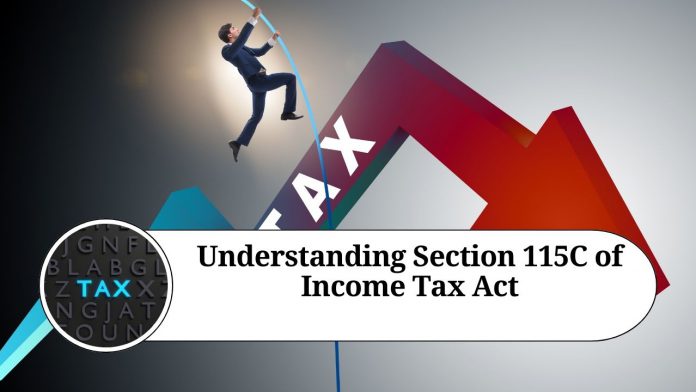The Indian Income Tax Act has various provisions to govern the taxation of different types of income. Section 115C of the Income Tax Act is one such provision that pertains to the taxation of income earned by non-resident Indians (NRIs) from foreign exchange assets.
In this blog, we will discuss the provisions of Section 115C in detail.
Introduction to Section 115C
Section 115C was introduced in the Income Tax Act in 1988. The primary objective of this section is to provide tax relief to NRIs who earn income from foreign exchange assets. These assets can be in the form of bank deposits, shares, securities, or any other similar asset.
The section applies only to non-residents, i.e., individuals who do not reside in India for more than 182 days in a financial year.
Provisions of Section 115C
Section 115C provides for a special tax regime for NRIs who earn income from foreign exchange assets. The following are the main provisions of this section:
- Tax on foreign exchange assets: Under Section 115C, the income earned by NRIs from foreign exchange assets is taxed at a flat rate of 20%. This tax is deducted at source (TDS) by the payer of the income.
- No deductions or exemptions: NRIs who earn income from foreign exchange assets cannot claim any deductions or exemptions under the Income Tax Act. This means that the tax liability is calculated on the gross income earned from foreign exchange assets.
- No further tax liability: Once the tax on foreign exchange assets is paid under Section 115C, the NRI is not liable to pay any further tax on that income. This means that the income earned from foreign exchange assets is exempt from tax under other provisions of the Income Tax Act.
- No tax credit: NRIs who pay tax on foreign exchange assets under Section 115C cannot claim a tax credit for the same in their home country. This is because the tax paid under this section is not considered as tax paid in India.
- Exemption for returning NRIs: If an NRI returns to India and becomes a resident, the provisions of Section 115C do not apply to them. They are required to pay tax on their worldwide income as per the normal tax provisions applicable to residents.
Conclusion
Section 115C of the Income Tax Act provides a tax benefit to NRIs who earn income from foreign exchange assets. It offers a flat tax rate of 20% on such income, with no further tax liability or tax credit. NRIs must keep in mind that they cannot claim any deductions or exemptions under this section, and if they return to India and become a resident, the provisions of this section will not apply to them.
It is advisable for NRIs to consult with a tax expert to understand the provisions of Section 115C and their tax obligations in India.
Read more useful content:
- section 145 of income tax act
- section 10e of income tax act
- section 9 of the income tax act
- section 94b of income tax act
- section 206aa of income tax act
Frequently Asked Questions (FAQs)
Q: What is Section 115C of the Income Tax Act?
A: Section 115C of the Income Tax Act provides for a special tax regime for non-resident Indians (NRIs) who earn income from foreign exchange assets.
Q: What are foreign exchange assets?
A: Foreign exchange assets refer to assets held by NRIs in a foreign currency. These can be in the form of bank deposits, shares, securities, or any other similar asset.
Q: Who does Section 115C apply to?
A: Section 115C applies only to non-resident Indians (NRIs), i.e., individuals who do not reside in India for more than 182 days in a financial year.
Q: What is the tax rate under Section 115C?
A: The tax rate under Section 115C is a flat 20% on the income earned by NRIs from foreign exchange assets.
Q: Is there any tax credit available under Section 115C?
A: No, NRIs who pay tax on foreign exchange assets under Section 115C cannot claim a tax credit for the same in their home country. This is because the tax paid under this section is not considered as tax paid in India.
Q: Can NRIs claim deductions or exemptions under Section 115C?
A: No, NRIs who earn income from foreign exchange assets cannot claim any deductions or exemptions under the Income Tax Act. This means that the tax liability is calculated on the gross income earned from foreign exchange assets.
Q: Is the income earned from foreign exchange assets exempt from tax under other provisions of the Income Tax Act?
A: Yes, once the tax on foreign exchange assets is paid under Section 115C, the NRI is not liable to pay any further tax on that income. This means that the income earned from foreign exchange assets is exempt from tax under other provisions of the Income Tax Act.
Q: What happens if an NRI returns to India and becomes a resident?
A: If an NRI returns to India and becomes a resident, the provisions of Section 115C do not apply to them. They are required to pay tax on their worldwide income as per the normal tax provisions applicable to residents.
Q: Is it necessary for NRIs to consult with a tax expert to understand the provisions of Section 115C?
A: It is advisable for NRIs to consult with a tax expert to understand the provisions of Section 115C and their tax obligations in India. This will help them avoid any errors or omissions while filing their tax returns.




















